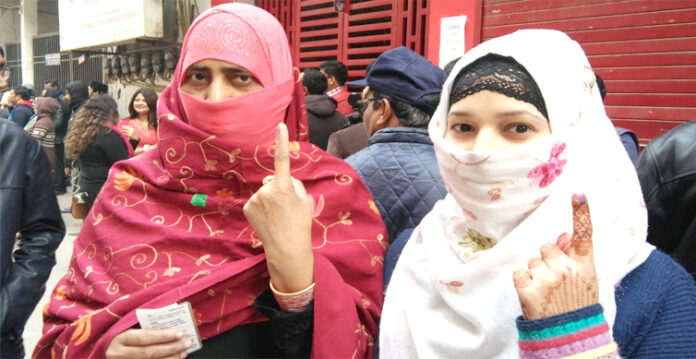As Delhi heads towards its crucial assembly elections on February 5, Muslim voters are emerging as a key factor in determining the outcome. With a population of around 12.86%, Muslims hold considerable sway, especially in constituencies with significant Muslim populations. Their support will be crucial in deciding the political future of Delhi, but many are grappling with disillusionment over past events.
The aftermath of the 2020 communal riots in northeast Delhi has left many Muslims feeling disillusioned with the Aam Aadmi Party (AAP), a party they had strongly supported in previous elections. Despite their overwhelming backing for AAP in 2020, many in the community feel let down by the party’s perceived inaction during the riots. This growing sense of resentment is a major factor in shaping the Muslim vote ahead of the upcoming elections.
“AAP may be our first choice when it comes to voting, but there is frustration over how the party handled the riots. We are unsure,” said Aftab, a 65-year-old mobile shop owner from Seelampur, a region heavily impacted by the 2020 riots. This sentiment is shared across constituencies like Mustafabad, Babarpur, Okhla, and Ballimaran, where Muslims still lean towards AAP but remain undecided due to the party’s handling of past issues.
Also Read: Muslims and Mahila: The Kingmakers of Delhi Elections
In response, Congress is attempting to capitalize on the growing discontent with AAP. Congress Rajya Sabha MP Imran Pratapgarhi recently highlighted the party’s historical ties with the Muslim community, urging voters to consider Congress’s past support. However, many Muslim voters, like Mujeeb, a textile shopkeeper from Seelampur, have expressed frustration with Congress’s failure to act during critical moments, such as the 2020 riots, making it harder for the party to regain their trust.
For AAP, securing Muslim support is crucial in this tight race. Chief Minister Arvind Kejriwal has focused on policies aimed at women voters, particularly the Rs 2,100 monthly financial assistance scheme, which has garnered significant support in areas like Okhla. “Around 50,000 women voters in Okhla have already registered for the scheme, giving AAP a substantial lead,” said Noorul Hasan, a retired teacher from the area.
Despite efforts by Congress and AAP to win over the Muslim community, the BJP is also looking to capitalize on perceived grievances. The BJP has accused AAP of neglecting certain issues, such as poor infrastructure and the controversial decision to renovate the boundary walls of a graveyard with waterproof tiles.
While AAP’s infrastructure development and financial schemes have garnered some support, many in the Muslim community continue to view the political divide through the lens of historical grievances. Tanvir Aijaz, an associate professor at Delhi University, noted that despite frustrations with AAP, many Muslims are likely to vote strategically to keep the BJP at bay. “In most places, Muslims vote strategically to defeat the BJP, and this election will likely be no different,” he said.
With Election Day fast approaching, the Muslim vote remains a critical battleground in Delhi’s political contest. Despite past grievances, the community’s choice will be shaped by both future promises and the broader challenge of keeping the BJP from gaining ground. Whether Muslim voters continue to back AAP or shift their allegiance to Congress could mark a turning point in the February 5 elections.
(This story is sourced from a third-party syndicated feed. Raavi Media takes no responsibility or liability of any nature. Raavi Media management/ythisnews.com can alter or delete the content without notice for any reason.)


